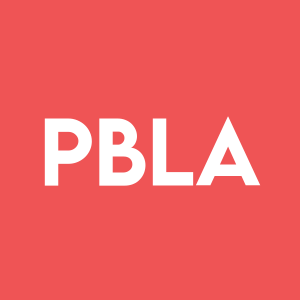Panbela Announces Research Agreement with Johns Hopkins University School of Medicine
Panbela Therapeutics (Nasdaq: PBLA) announced a research agreement with Johns Hopkins University School of Medicine to advance SBP-101, a polyamine analogue aimed at treating pancreatic cancer. This collaboration will explore SBP-101's effectiveness across various cancer cell lines, its biomarker potential, and its compatibility with checkpoint inhibitors. Led by Prof. Robert Casero, SBP-101 has demonstrated tumor growth inhibition in clinical studies without aggravating typical chemotherapy side effects. Future evaluations will depend on regulatory approvals and ongoing clinical trials.
- Research agreement with Johns Hopkins may enhance SBP-101's development.
- SBP-101 shows potential tumor growth inhibition in clinical studies.
- No exacerbation of chemotherapy-related side effects reported.
- Dependence on FDA's approval for continued evaluation of SBP-101.
- Research outcomes and collaboration effectiveness remain uncertain.
Insights
Analyzing...
MINNEAPOLIS, Feb. 10, 2021 (GLOBE NEWSWIRE) -- Panbela Therapeutics, Inc. (Nasdaq: PBLA), a clinical stage biopharmaceutical company developing disruptive therapeutics for the treatment of patients with cancer, today announced a research agreement with the Johns Hopkins University School of Medicine. The collaboration is intended to focus on the further development of Panbela’s investigative agent SBP-101, including activity in cell lines outside of pancreatic cancer, biomarkers informing diagnostics and potential combination with checkpoint inhibitors.
The research will be led by Prof. Robert Casero, an internationally recognized researcher in polyamine biology at the Johns Hopkins Kimmel Cancer Center and a professor of oncology at Johns Hopkins University School of Medicine. Prof. Casero is a molecular pharmacologist whose research focuses on developing drugs that target critical pathways for chemotherapy and chemoprevention, including amine metabolism, epigenetic regulation and inflammation.
About SBP-101
SBP-101 is a proprietary polyamine analogue designed to induce polyamine metabolic inhibition (PMI) by exploiting an observed high affinity of the compound for pancreatic ductal adenocarcinoma and other tumors. The molecule has shown signals of tumor growth inhibition in clinical studies of US and Australian metastatic pancreatic cancer patients, suggesting complementary activity with an existing FDA-approved standard chemotherapy regimen. In clinical studies to date, SBP-101 has not shown exacerbation of the typical chemotherapy-related adverse events of bone marrow suppression and peripheral neuropathy. The safety data and PMI profile observed in the current Panbela sponsored current clinical trial generally provides support for continued evaluation of the compound in a randomized clinical trial subject to Panbela’s submission of a complete response and the FDA’s removal of the partial clinical hold. For more information, please visit https://clinicaltrials.gov/ct2/show/NCT03412799.
About Panbela
Panbela Therapeutics, Inc. is a clinical-stage biopharmaceutical company developing disruptive therapeutics for patients with urgent unmet medical needs. The company’s initial product candidate, SBP-101, is for the treatment of patients with metastatic pancreatic ductal adenocarcinoma, the most common type of pancreatic cancer. Panbela Therapeutics, Inc. is dedicated to treating patients with pancreatic cancer and exploring SBP-101’s potential for efficacy in combination with other agents and in treating other types of cancer. Further information can be found at www.panbela.com . Panbela Therapeutics, Inc. common stock is listed on The Nasdaq Stock Market LLC under the symbol PBLA.
Cautionary Statement Regarding Forward-Looking Statements
This press release contains “forward-looking statements,” including within the meaning of the Private Securities Litigation Reform Act of 1995. Forward-looking statements can be identified by words such as: “believes,” “expect,” “intend,” “may,” and “plan.” Examples of forward-looking statements include, among others, statements we make regarding the focus and outcomes of the collaboration. Forward-looking statements are neither historical facts nor assurances of future performance. Instead, they are based only on our current beliefs, expectations, and assumptions regarding the future of our business, future plans and strategies, projections, anticipated events and trends, the economy and other future conditions. Because forward-looking statements relate to the future, they are subject to inherent uncertainties, risks and changes in circumstances that are difficult to predict and many of which are outside of our control. Our actual results and financial condition may differ materially and adversely from the forward-looking statements. Therefore, you should not rely on any of these forward-looking statements. Important factors that could cause our actual results and financial condition to differ materially from those indicated in the forward-looking statements include, among others, the following: (i) our ability to obtain additional funding to complete Phase 1 clinical trial; (ii) progress and success of our Phase 1 clinical trial; (iii) the impact of the current COVID-19 pandemic on our ability to complete enrollment in our current clinical trial; (iv) our ability to demonstrate the safety and effectiveness of our SBP-101 product candidate (v) our ability to obtain regulatory approvals for our SBP-101 product candidate in the United States, the European Union or other international markets; (vi) the market acceptance and level of future sales of our SBP-101 product candidate; (vii) the cost and delays in product development that may result from changes in regulatory oversight applicable to our SBP-101 product candidate; (viii) the rate of progress in establishing reimbursement arrangements with third-party payors; (ix) the effect of competing technological and market developments; (x) the costs involved in filing and prosecuting patent applications and enforcing or defending patent claims; and (xi) such other factors as discussed in Part I, Item 1A under the caption “Risk Factors” in our most recent Annual Report on Form 10-K, any additional risks presented in our Quarterly Reports on Form 10-Q and our Current Reports on Form 8-K. Any forward-looking statement made by us in this press release is based on information currently available to us and speaks only as of the date on which it is made. We undertake no obligation to publicly update any forward-looking statement or reasons why actual results would differ from those anticipated in any such forward-looking statement, whether written or oral, whether as a result of new information, future developments or otherwise.
Contact Information:
Investors:
James Carbonara
Hayden IR
(646) 755-7412
james@haydenir.com
Media:
Tammy Groene
Panbela Therapeutics, Inc.
(952) 479-1196
IR@panbela.com







